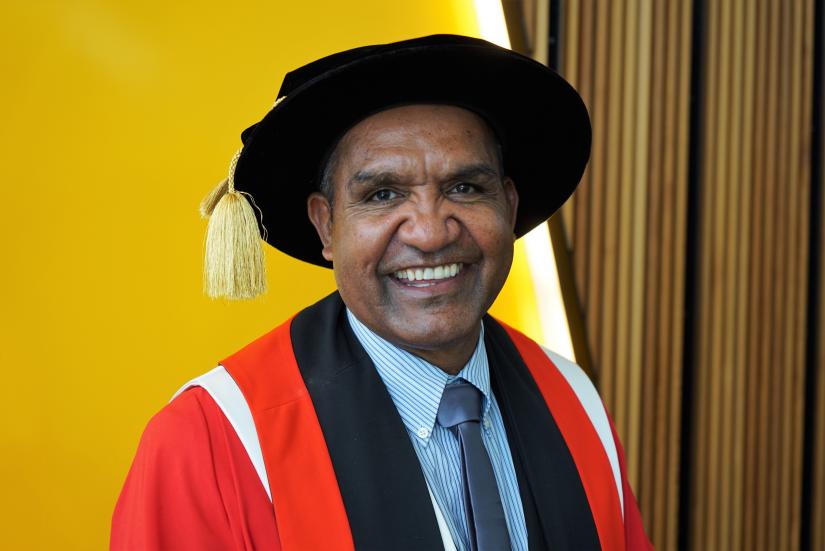Dean Jarrett has just been awarded a doctorate from UTS Business School. His thesis examines factors that can help support and grow the Indigenous business sector.

Dr Dean Jarrett. Photo: Leilah Schubert
As an Indigenous business owner, Dr Dean Jarrett wanted to understand the factors that could help Indigenous businesses work successfully with large corporate and government organisations.
He also wanted to provide a voice for Indigenous business owners, to see if more could be done to support and grow the Indigenous business sector.
This led him on a five-year academic journey, including almost a year in the US as a Fulbright Scholar, which has just culminated in the awarding of his doctorate from the University of Technology Sydney.
He is only the second Indigenous person to receive a PhD from UTS Business School, and the first male to do so.
There is a need to move away from a transactional way of engagement to a relational way of engagement.
Dr Dean Jarrett
Dr Jarrett’s PhD thesis provides robust evidence that rather than Indigenous business needing to imitate mainstream ways of working to achieve success, it is the other way around.
Mainstream business has much to learn from the cultural value system that underpins Indigenous business practice – an approach established over many thousands of years.
In particular, Dr Jarrett reveals how a focus on developing trusting, equal and reciprocal relationships can minimise business transaction costs and deliver positive social and commercial outcomes.
“There is a need to move away from a transactional way of engagement to a relational way of engagement,” Dr Jarrett says.
Dr Jarrett interviewed Indigenous business owners in Australia and the US to compare and contrast approaches to supporting Indigenous business, particularly through supplier diversity initiatives.
“Inclusive procurement, while well-intentioned, is sometimes applied in counter-productive ways that create numerous challenges in commercial relationships,” Dr Jarrett says.
His thesis revealed unique insights into the relational factors that underpin economic transactions between Indigenous suppliers and the large organisations that purchase their goods and services.
He found the top five challenges confronting Indigenous businesses were business size and capacity, tokenism or perfunctory compliance from large purchaser organisations, negative buyer perceptions, perceived racism, and power inequality.
The top five factors underpinning positive commercial relationships for Indigenous businesses were strong personal relationships, trust and reciprocity, collaboration, information sharing, and similar values, ethics and principles.
“Cultural values that underpin Indigenous business, including reciprocity and obligations to community, are in stark contrast to individualism, neoliberalism, and traditional Western business models,” says UTS Associate Professor Bronwen Dalton, who co-supervised Dr Jarrett’s doctoral thesis.
“Mainstream business models often see buyers and sellers transacting at arm’s length, in a supply chain where participants never meet, and without developing the trust necessary to ensure an ongoing relationship.
“On the other hand, Indigenous approaches to managing relationships are built around developing trust, power-sharing and reciprocity – approaches that reduce transaction costs from trust breakdowns,” she says.
The costs involved in changing suppliers and acquiring new purchasers can be high, so this approach could provide significant savings for both large and small organisations.
The principles that govern Indigenous businesses have more in common with values-driven social enterprise business models where there is a greater balance between profit and purpose, says UTS Jumbunna Director of Research Distinguished Professor Larissa Behrendt, a Eualeyai/Kamillaroi woman.
“As the oldest living culture, Indigenous trade and business practice was sophisticated and extensive, from the Gunditjmara eel farms to trade with Indonesia,” Professor Behrendt says.
“Aboriginal cultural stories and traditions include valuable messages and wisdom around business practice, including the importance of sharing resources and the consequences of selfishness,” she says.
Mainstream business models often see buyers and sellers transacting at arm’s length, in a supply chain where participants never meet, and without developing the trust necessary to ensure an ongoing relationship.
Associate Professor Bronwen Dalton
Dr Jarrett says all the Indigenous business owners he spoke to were primarily focused on helping the community, providing role models, and creating employment opportunities. Financial gains for individuals were a secondary focus.
As one of his respondents commented: “It always comes down to culture and community first. So, we're not going to bulldoze or step over one another to get to that finish line. It's always having culture front and centre to everything that we do and everything that we're about.”
Dr Jarrett’s research draws on Indigenous standpoint theory, a perspective centred on Indigenous experience that includes his own experience as an Indigenous business practitioner. From this standpoint, it shines a light on purchasing practices of large corporate and government organisations.
“I looked at these issues from the perspective of an Indigenous researcher, with Indigenous respondents, exploring Indigenous concerns,” he says.
His findings reveal that a greater appreciation and adoption of Indigenous business values and practices can help build respectful, collaborative and strategic business partnerships not only with Indigenous suppliers but across all commercial relationships.

